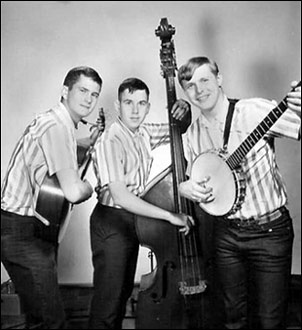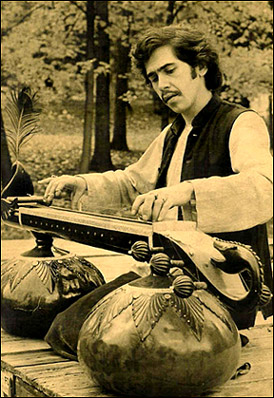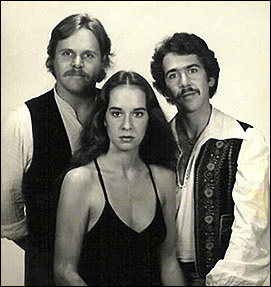|
Willy Schwarz’s vision has always been eclectic.
After decades spent absorbing music from around the
globe, Willy has alchemically transformed his experience
into songs – songs that reflect his love for the dozens
of traditions he’s studied, yet maintain the unity of
conception and imagination that is the prerogative of a
master storyteller and a master.
As a child, Willy had learned the Italian and German
folksongs his parents sung together. At seven, he began
making up melodies at the piano – at first just to keep
his mother happy while she did the ironing. By his early
teens, he’d taught himself to play the lute (after
pestering his dad for months to buy one), then learned
to play at least a dozen different instruments; Young
Willy was clearly destined for a life in music
Schwarz began traveling internationally at 13. As the
leader of a folk trio the ‘Young-uns’ he went on his
first American tour at 14. Schwarz has hardly stopped in
the four decades since then.

The Young-uns
Though the world is full of musical nomads, few indeed
have gone so far and learned so much. Willy went on to
sing, play, learn and explore all over the world –
traveling from Brooklyn to Bombay on an Indian
freighter, moving from Kathmandu to Kabul – wherever
Willy went, his restless musical mind absorbed the songs
and sounds he heard, transforming them in the crucible
of imagination.

Willy playing the Vichitra Vina
To hear and see the Vichitra Vina click here
In the 1980’s he toured internationally with the
critically-acclaimed trio ‘Eclectricity’, whose enormous
spectrum of music defined ‘World Music’ a decade before
it became a recorgnized musical category.

Eclectricity
Though this multi-instrumentalist is probably best
known for his stint as keyboardist and sideman to Tom
Waits, Schwarz’ resume commands other accolades such as
his internationally-acclaimed musical travelogue ‘Jewish
Music Around the World’.He has also created many musical
compositions for theater, using his exotic and
conventional instruments to score dozens of plays in
Chicago, several of which have toured across America,
Europe and Broadway. Willy often served as onstage
musician and music director.
Throughout the 1990’s Chicago’s commercial music
producers knew him as ‘the weird instrument guy’ – If
you needed an Indonesian flute, a Tibetan trumpet or a
Ugandan kettledrum, Willy Schwarz would not only bring
them, he’d play them brilliantly, idiomatically and with
consummate musicianship.
A love for the genuine led Willy to research Chicago’s
immigrant musical traditions with the intent of
presenting the music to listeners across the USA over
National Public Radio. He took this idea further and
assembled the 21-piece ‘All American Immigrant
Orchestra’, which featured solo and ensemble playing and
singing from Brazil, Puerto Rico, China, India, Poland
Hungary, Quebec and Armenia; topping the Chicago
Tribune’s list of Best Concerts of 1999. After the
success of the Chicago project, he followed suit in
Europe, organizing an analogous ensemble known as the
‘Bremen Immigranten Orchester’, whose premiere
performance was received with equal enthusiasm as it’s
Chicago predecessor.
Throughout all his travels, Schwarz kept adding to an
ever-growing file of original songs. Well over a decade
of creating music for other people’s visions, he decided
it was time for his own unique conception of
‘multi-ethnic singer-songwriting’. Travelling to the
Indian city of Pune, Willy laid down the basic tracks of
his first solo album with the help of over twenty Indian
instrumentalists. ‘Live for the Moment’ was finished in
Chicago with contributions from artists like Paul
Wertico and Howard Levy. It won highest critical praise
after its release in 1999. His follow-up CD, a song
cycle titled ‘HOME; Songs of Immigrants, Refugees and
Exiles’ was released in 2001.
Most recently, Willy Schwarz has composed the music for
Mary Zimmerman’s Tony-Award winning Broadway hit,
‘Metamorphoses’, for which he won the 2002 Drama Desk
Award for Outstanding Music in a Play. The soundscore
for ‘Metamorphoses’ and other theatre music of Willy
Schwarz was released by Knitting Factory Records.
Willy has toured and collaborated with such diverse
artists as Tom Waits, Theodore Bikel, Ravi Shankar, Alan
Ginsberg, David Amram, Shlomo Carlebach and Leon
Russell.
Willy was awarded the Villa Ichon Peace and Culture
Prize 2011 for his work in bringing together music and
musicians from many cultures.
The Light of Asia
The Light of Asia was a unique film collaboration of
European filmmakers with Indian actors, filmed entirely
on location in India, and premiering as a silent film
both there and in England (for the Royals as well) in
1925.The film was known by 3 different titles;
"Prem Sanyaas" (Love or Asceticism) – Die Leuchte
Asiens-The Light of Asia, the story of prince Gautama’s
agonizing choice between his deep love for his wife, and
a life of asceticism, leading to enlightenment, and his
emergence as the Buddha.
Thanks to the new soundtrack composed by Willy Schwarz,
the 98-minute film is now supported with traditional
Indian instruments like Vichitra Vina, Sarod, Bansuri,
Sarangi, Santur, Tabla, and a host of other rare
instruments; all themes played and composed by
Schwarz. Adding to the mix of Indian Classical and
Folk melodies, Riccardo Castagnola’s talents as
contemporary electronic composer are well-used for the
dream and magical sequences.
The film was screened twice at the prestigious Berlinale
Film Festival of 2018, and Willy was invited to present
the film with live-performed interludes at the Goethe
Institute in Chennai, India the following year.
The possibilities for general streaming of "The Light of
Asia" are being currently examined. . . stay tuned!
|



